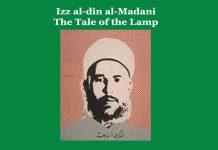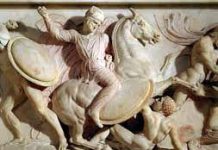Muhammad Shukri | The Night and the Sea | An Analytical Study
–Menonim Menonimus
Muhammad Shukri | The Night and the Sea | An Analytical Study
Muhammad Shukri | The Night and the Sea | An Analytical Study
‘The Night and the Sea’ is a Moroccan Arabic short story written by Muhammad Shukri (1935-2003). The story treats the theme of sex and cruelty to animals. There is no specific plot but characters through which the author brings about his themes.
The main character of the story is Zubeida. She is a sex worker and sleeps with people whom she does not love. On a night, on the sea beach, she meets a foreigner named Widad. He is almost old but adulterous. He has come to the land to satisfy his lust for the prostitutes. Zubeida was tall with bulging eyes. She had the kind of body that was always ready to give pleasure to a battalion of soldiers returning victorious from war.
At night they went to a bar where they meet a young man with his girlfriend. She was weeping as she saw her boyfriend with a girl named Naida. Then they ordered some wine and began to exchange kisses. Their romance with wine continued. In the meantime, a black Moroccan man walked in, handsome and smartly dressed. He sat with two others at a table and started to recount how he had saved a girl from drowning on the beach. The black man touched her and she looked at him in the darkness. He smiled at her that nothing could satisfy him. These feelings for a man who longed for her without her having any clear desire were like a dark night to her. Then she departed and the black man followed her swaggering his shoulders.
In addition to the theme of sex, there is the theme of cruelty to animals in the story. Zubeida narrates that one day her mother was cleaning a fish. Then a cat came meowing to her and when she tried to shoo it away, the cat attacked her, sinking its teeth and claws in her hand. Two days later, the cat came again to the same house and her mother found a pretext to punish her in a small room. After a few days, they opened the door and found a ghost-like creature that could barely move. Then her mother sent her son Mustafa and daughter Zubeida to take it to a remote and desolate place to let it free.
Widad also narrated a story of a cat that belonged to a man called Miloud al-Farsi. He was a bachelor who shared his own food with his beautiful cat. He bathed the cat and let her sleep in his bed. When she grew old and sick her beautiful hair began to fall out, she grabbed her by the neck and held her down in the water until she died.
As there is no specific plot, so there is no logical structure of what the author narrates in the story. It has neither beginning nor end but the sporadic narration of Zubeida and some of her customers at a bar of wine.
The setting of the story is a beach. The author gives a vivid picture of the sea beach where Zubeida noticed an old man dressed in rags was limping along, throwing pieces of bread to the seagulls. She stopped and looked at the small beach huts, most of them without doors. All the bars were closed. The old man was leaving the beach, tossing the last crumbs of bread to the birds. Some of the birds still followed him.
There is a vivid scene of the wine bar as portrayed in the story:
The barman placed a glass of wine and a sugar bowl in front of Zubeida. She scooped a spoonful of sugar into her glass and stirred it in. Widad thought to herself that Nabil had a similar habit of putting salt in his bar to slow down the effects of the alcohol.”
The Dialogue used in the story is appropriate to the characters and situation.
The author has failed to express his philosophy of life in the story.
The language of the story is simple and easy. There are some uses of similes in the story, as:
(1) ‘…she was like a flower without a stem.’
(2) ‘A thought like a perfumed flower blossomed in Widad’s mind, racked with sorrow about the things she had never had.”
As the short story is a story of character without a plot so there is no question of maintaining all the elements and qualities of a good short story in it.
In conclusion, it may be said that Muhammad Shukri’s short story entitled ‘The Night and the Sea” is a story of medium length dealing with the theme of sex and cruelty to animals, written in the third person ignoring the logical construction of a good story. 0 0 0 The Night and the Sea
Muhammad Shukri | The Night and the Sea | An Analytical Study
Read More: Izz al-din al-Madani Short Story ‘The Tale of the Lamp’-An Analytical Study
Muhammad Shukri | The Night and the Sea | An Analytical Study
N. B. This article entitled ‘Muhammad Shukri | The Night and the Sea | An Analytical Study’ originally belongs to the book ‘Analytical Studies of Some Arabic Short Stories‘ by Menonim Menonimus. Muhammad Shukri | The Night and the Sea | An Analytical Study
Books of Literary Criticism by M. Menonimus:
- World Short Story Criticism
- World Poetry Criticism
- World Drama Criticism
- World Novel Criticism
- World Essay Criticism
- Indian English Poetry Criticism
- Indian English Poets and Poetry Chief Features
- Emily Dickinson’s Poetry-A Thematic Study
- Walt Whitman’s Poetry-A Thematic Study
- Critical Essays on English Poetry
- Tawfiq al-Hakim’s Novel: Return of the Spirit-An Analytical Study
- Tawfiq al-Hakim’s Novel: ‘Yawmiyyat Naib Fil Arayaf’-An Analytical Study
- Analytical Studies of Some Arabic Short Stories
- A Brief History of Arabic Literature: Pre-Islamic Period …
Related Searches:
- The Night and the Sea
- Muhammad Shukri | The Night and the Sea
- Muhammad Shukri: A Close Look
- Night by the Sea
- Tale of the Lamp
- Izz al-din al-Madani
- Arabic Short Stories Archives
- Modern Arabic Literature











